Tyler Creek Watershed
Tyler Creek Watershed Coalition Meeting Oct. 16, 2024 6 PM
The Tyler Creek Watershed Coalition will hold its Annual General Membership Meeting on Wednesday, October 16, 2024, at the restored Nancy Kimball Cobblestone House at 302 W. Chicago Street, Elgin, IL.
The meeting will begin at 6 pm. Speakers will be from the Elgin City of Elgin’s Sustainability Department. Refreshments will be provided.
The Tyler Creek Watershed Coalition is a 501(c)3 scientific, educational, and charitable corporation. For more information, call 847-275-5741.
The Tyler Creek Watershed Coalition is comprised of watershed stakeholders who are committed to work together to preserve and protect the water quality and natural resources of Tyler Creek, a tributary to the Fox River in Northeastern Illinois.
Our mission is to bring together a diverse coalition of stakeholders to protect the unique and irreplaceable natural resources of the Tyler Creek Watershed through cooperative partnerships, smart land use decisions and sensible growth.
Shown below - map of the Tyler Creek Watershed
Our mission is to bring together a diverse coalition of stakeholders to protect the unique and irreplaceable natural resources of the Tyler Creek Watershed through cooperative partnerships, smart land use decisions and sensible growth.
Shown below - map of the Tyler Creek Watershed
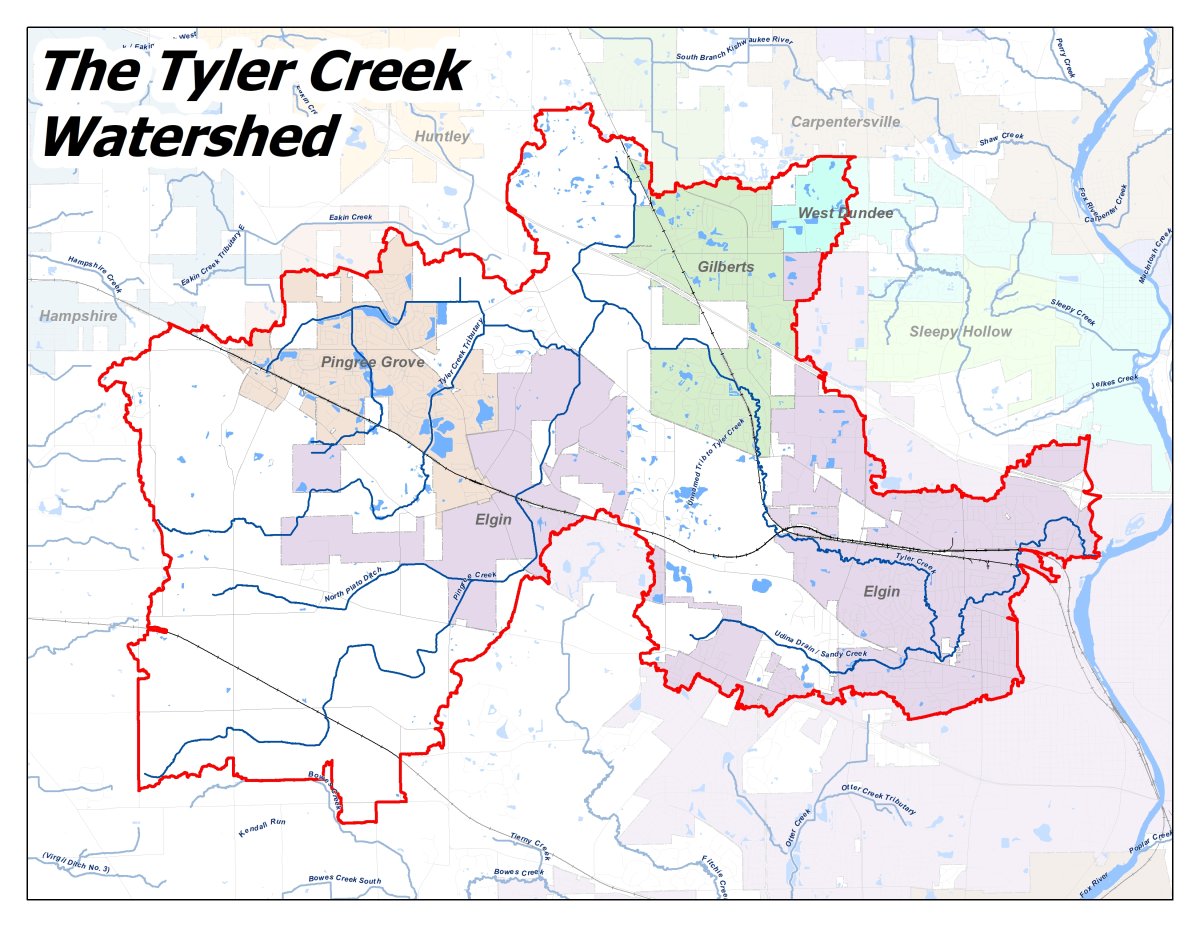
Tyler Creek is a medium sized, high quality tributary of the Fox River. The stream drains generally to the southeast from southern Rutland Township toward the northwest side of Elgin, where it joins the Fox River. The Tyler Creek Watershed encompasses about 40.4 square miles and includes the small tributaries of Pingree Creek, Sandy Creek, and North Plato Ditch. The watershed currently has two very contrasting characteristics: the eastern part of the watershed is highly urbanized, dominated by more than 4000 acres of contiguous development. The central and western portions of the watershed are agricultural in nature, with corn and soybean fields the dominant land cover. Also present in this area are two municipalities (Village of Gilberts and Village of Pingree Grove) and numerous small pockets of remaining upland forest, shallow emergent and wet meadow wetlands.
Click for a short history, summary of accomplishments, and future programs of the Tyler Creek Watershed Coalition
Tyler Creek Watershed Coalition Meetings
The Coaltion normally meets the third Wednesday at 4:30 PM at the Riverside Water Treatment Plant, 375 W River Rd, Elgin
The Coaltion normally meets the third Wednesday at 4:30 PM at the Riverside Water Treatment Plant, 375 W River Rd, Elgin
Join us Wednesday, October 25, 2023, at 7pm Judson University
The Freshwater Mussels of the Fox River Watershed of Wisconsin and Illinois
More than 70% of the three hundred freshwater mussel species historically known from North America are threatened, endangered, or in need of conservation. To learn more about these creatures, Alison Stodola, the curator of Malacology at the Illinois Natural History Survey, brings 15 years of expertise to the captivating realm of freshwater mussels, specifically within the wadable streams of Illinois. Her upcoming talk promises to illuminate the fascinating life history of these remarkable creatures and shed light on the current research efforts underway in Illinois.
Alison Stodola will be Live Streaming her fascinating talk to the campus of Judson University on Wednesday, October 25, 2023, at 7pm in the Reed Room on the first floor of the Lindner Tower Conference Center. The University is located at 500 W State Street, Elgin, IL 60123. Please join us, the Tyler Creek Watershed Coalition, and Judson University, hosts of this free event. Free refreshments will be available.
More than 70% of the three hundred freshwater mussel species historically known from North America are threatened, endangered, or in need of conservation. To learn more about these creatures, Alison Stodola, the curator of Malacology at the Illinois Natural History Survey, brings 15 years of expertise to the captivating realm of freshwater mussels, specifically within the wadable streams of Illinois. Her upcoming talk promises to illuminate the fascinating life history of these remarkable creatures and shed light on the current research efforts underway in Illinois.
Alison Stodola will be Live Streaming her fascinating talk to the campus of Judson University on Wednesday, October 25, 2023, at 7pm in the Reed Room on the first floor of the Lindner Tower Conference Center. The University is located at 500 W State Street, Elgin, IL 60123. Please join us, the Tyler Creek Watershed Coalition, and Judson University, hosts of this free event. Free refreshments will be available.
Scroll down for posted Meeting Minutes
A Tyler Creek Mitigation Project - Fall of 2022
The Tyler Creek Watershed Coalition (TCWC) has been involved in several erosion mitigation projects on Tyler Creek in the Garden Quarter Townhome development. TCWC has helped guide the Homeowners Association, and others who live on the creek, through the process of finding professionals who can do the needed work and then to get funding to help pay for the work that is done.
Planning for the most recent project in Garden Quarter started in the spring of 2022 and was done for a very steep hill, known as the *HILL", with a group of 7 connected townhomes at the top. The end unit was very close to the edge of the HILL and the HILL has been eroding and created a condition that put the townhome in danger of losing support. (It is interesting to note that the potential for serious erosion at this site was identified in the year/ 2000. Only recently did the situation rise to an elevated Ievel of concern.)
Photos: The first (8956) was supplied by Sandra Schmulbach and taken before the mitigation began. The second was supplied by Carl Missele shortly after phase one of the project was completed.
Link to full report
The Tyler Creek Watershed Coalition (TCWC) has been involved in several erosion mitigation projects on Tyler Creek in the Garden Quarter Townhome development. TCWC has helped guide the Homeowners Association, and others who live on the creek, through the process of finding professionals who can do the needed work and then to get funding to help pay for the work that is done.
Planning for the most recent project in Garden Quarter started in the spring of 2022 and was done for a very steep hill, known as the *HILL", with a group of 7 connected townhomes at the top. The end unit was very close to the edge of the HILL and the HILL has been eroding and created a condition that put the townhome in danger of losing support. (It is interesting to note that the potential for serious erosion at this site was identified in the year/ 2000. Only recently did the situation rise to an elevated Ievel of concern.)
Photos: The first (8956) was supplied by Sandra Schmulbach and taken before the mitigation began. The second was supplied by Carl Missele shortly after phase one of the project was completed.
Link to full report
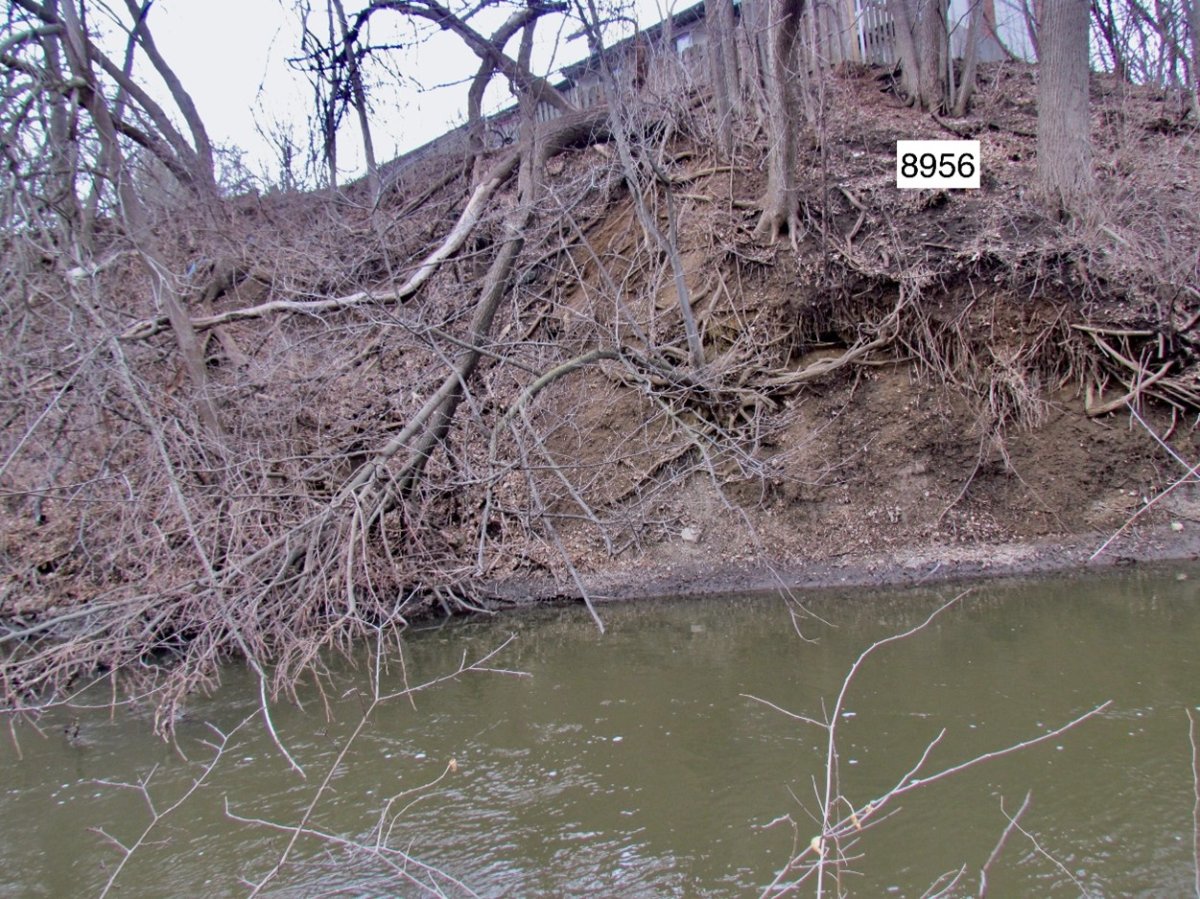
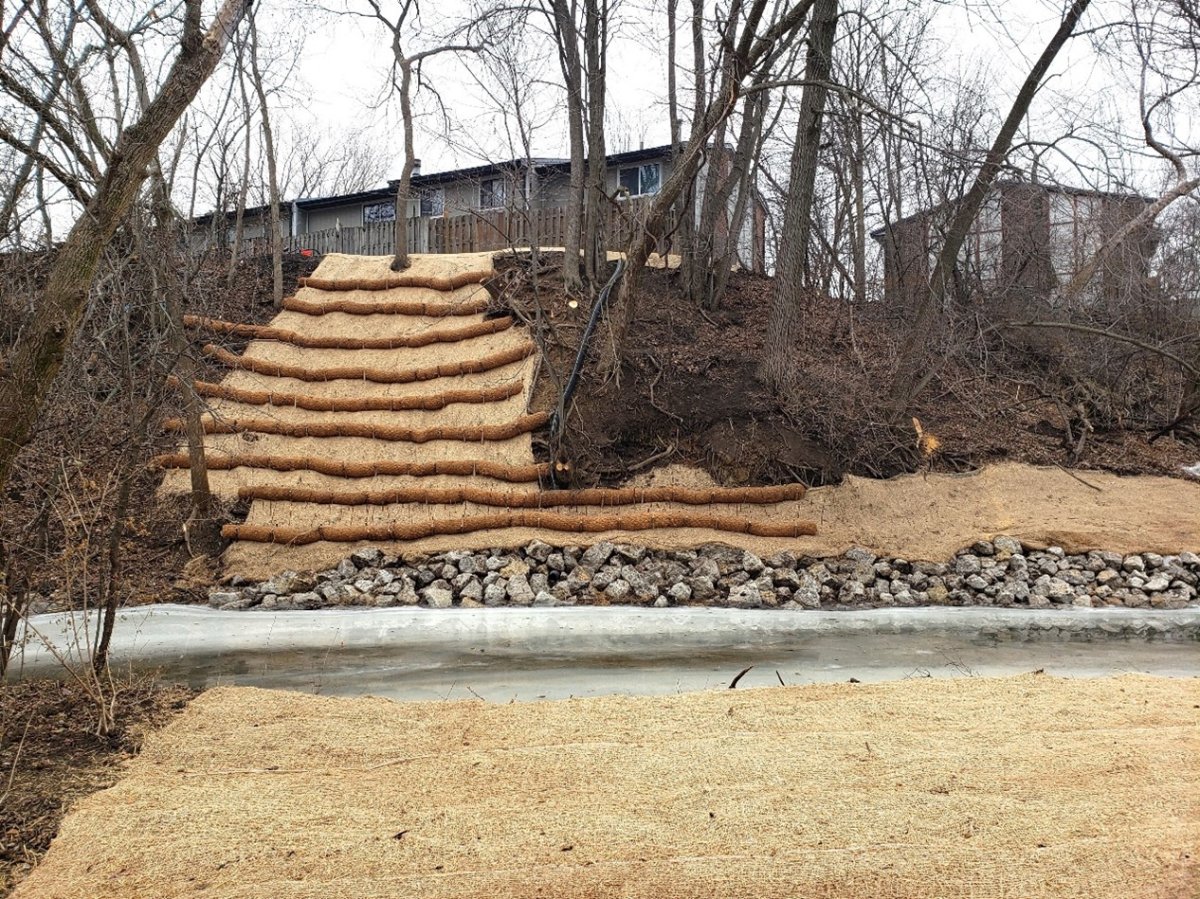
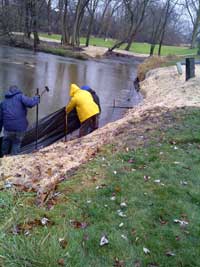
streambank stabilization
Stream/Water Quality Ratings
Tyler Creek was listed in the IEPA’s 305(b) Report as being in Full Support of its Designated Use, which was listed as Aquatic Life. The IEPA also identified fish consumption as a designated use for Tyler Creek, although the rating for this use as classified as “not assessed”. There are no other formal analyses which have been completed in the watershed to identify existing water quality or aquatic life impairments, although agricultural ditching and stream corridor encroachment have undoubtedly had significant impacts to the water quality and diversity of aquatic life that historically occurred in the watershed. Below its confluence with Tyler Creek, however, the Fox River is listed as an impaired waterway for pH, silt, dissolved oxygen, fecal coliform, total suspended solids, habitat and flow modifications, excessive algae, PCBs, and methoxychlor.
Reason for Concern
Tyler Creek was listed in the IEPA’s 305(b) Report as being in Full Support of its Designated Use, which was listed as Aquatic Life. The IEPA also identified fish consumption as a designated use for Tyler Creek, although the rating for this use as classified as “not assessed”. There are no other formal analyses which have been completed in the watershed to identify existing water quality or aquatic life impairments, although agricultural ditching and stream corridor encroachment have undoubtedly had significant impacts to the water quality and diversity of aquatic life that historically occurred in the watershed. Below its confluence with Tyler Creek, however, the Fox River is listed as an impaired waterway for pH, silt, dissolved oxygen, fecal coliform, total suspended solids, habitat and flow modifications, excessive algae, PCBs, and methoxychlor.
Reason for Concern
The primary concern for the Tyler Creek watershed is not so much existing degradation of watershed resources, but rather the potential for negative impacts brought about by the rapid expansion of suburban development from municipalities within the watershed. The three municipalities are currently undertaking or planning extensive development through annexation of land currently in agricultural use. The City of Elgin plans to annex about 8000 acres of the Tyler Creek Watershed at this time and possibly another 2100 acres in a subsequent Facilities Plan Amendment. This is part of the City of Elgin’s Far West Area Plan, which upon final completion could account for nearly 55% of the total watershed area (10,300 acres new development in addition to 4000+ acres of Elgin currently in the Tyler Watershed).
It is essential that the watershed plan be updated so that existing natural resources can be protected and water quality maintained following the urbanization of this watershed. The City of Elgin, Village of Gilberts, and the Village of Pingree Grove has all indicated a willingness to cooperate and partner on this watershed initiative, which is essential to the effectiveness of the plan and its implementation strategies.
Watershed Plans
The original watershed plan for Tyler Creek was completed in January 1996 by Openlands Project with input and guidance from the City of Elgin, Village of Gilberts, Kane County Forest Preserve District, Kane County, and the IDNR. Funding was provided by the IDNR Office of Realty and Environmental Planning. The plan provided a summary of watershed history, current physical, chemical and biological characteristics of the watershed, and an outline for establishment of a watershed greenway plan, general watershed protection guidelines, and recommendations for restoration/protection of specific sites of concern/interest in the watershed’s sub areas.
In 1997, the City of Elgin completed the Tyler Creek Management Plan, which focused on stormwater management and natural resource protection in the lower 1/3 of the watershed within the municipal limits of Elgin (current as well as proposed city limits at that time). This plan was born out of the City’s need to insure the creek through the lower, already developed, portion of the City would not experience additional degradation due to further development upstream following municipal expansion. This plan identified stormwater management strategies for future development, stormwater retrofit projects, stream corridor restoration / stabilization projects, and wetland banks as part of a plan to improve water quality and reduce flooding. In 2000, the City took this plan a step further and prepared an EPA 319 grant application that included preliminary design plans and cost estimates for implementing several (12-13) of the projects identified in the 1997 Tyler Creek Management Plan. To date, at least two of these projects have been implemented by the City of Elgin.
The original watershed plan has been revised to reflect current conditions as well as address specific criteria for watershed plans established by the Illinois Environmental Protection Agency. These new criteria are designed to make watershed plans much more specific about the problems present in the watershed, the solutions or practices that could mitigate those problems, and identification of implementation costs and assigning of responsibilities to stakeholders to insure recommendations are put into practice. The last criteria the plan addresses is establishing a monitoring program in order to track the effectiveness of the watershed plan over time.
The original watershed plan for Tyler Creek was completed in January 1996 by Openlands Project with input and guidance from the City of Elgin, Village of Gilberts, Kane County Forest Preserve District, Kane County, and the IDNR. Funding was provided by the IDNR Office of Realty and Environmental Planning. The plan provided a summary of watershed history, current physical, chemical and biological characteristics of the watershed, and an outline for establishment of a watershed greenway plan, general watershed protection guidelines, and recommendations for restoration/protection of specific sites of concern/interest in the watershed’s sub areas.
In 1997, the City of Elgin completed the Tyler Creek Management Plan, which focused on stormwater management and natural resource protection in the lower 1/3 of the watershed within the municipal limits of Elgin (current as well as proposed city limits at that time). This plan was born out of the City’s need to insure the creek through the lower, already developed, portion of the City would not experience additional degradation due to further development upstream following municipal expansion. This plan identified stormwater management strategies for future development, stormwater retrofit projects, stream corridor restoration / stabilization projects, and wetland banks as part of a plan to improve water quality and reduce flooding. In 2000, the City took this plan a step further and prepared an EPA 319 grant application that included preliminary design plans and cost estimates for implementing several (12-13) of the projects identified in the 1997 Tyler Creek Management Plan. To date, at least two of these projects have been implemented by the City of Elgin.
The original watershed plan has been revised to reflect current conditions as well as address specific criteria for watershed plans established by the Illinois Environmental Protection Agency. These new criteria are designed to make watershed plans much more specific about the problems present in the watershed, the solutions or practices that could mitigate those problems, and identification of implementation costs and assigning of responsibilities to stakeholders to insure recommendations are put into practice. The last criteria the plan addresses is establishing a monitoring program in order to track the effectiveness of the watershed plan over time.
Tyler Creek Watershed Coalition News
July 2021 Tyler Creek Watershed Coalition tours Pingree Grove water and wastewater treatment facilities
The Tyler Creek Watershed Coalition (TCWC) toured the
Village of Pingree Grove’s community water supply and wastewater treatment
facilities on July 21, 2021. Pat
Doherty, Director of Public Works, was our host and tour guide.
Pingree Grove sits in the northwestern portion of the 40.5 square mile Tyler Creek watershed (see Tyler Creek watershed map below). Tyler Creek flows from west to east through the northern portion of the Village on its way to the Fox River in Elgin. The Village treats groundwater from two wells to provide potable water for its residents and businesses as well as for fire suppression needs. For wastewater treatment, the Village uses an innovative land application approach for effluent disposal that helps reduce use of the potable water supply for landscape watering and thereby helps conserve groundwater. After complete treatment that meets or exceeds EPA requirements, the effluent is first stored in the Village’s 26-acre lagoon and then piped through their irrigation system to four zones as needed to water lawn and flower bed areas on Village-owned properties and rights-of-way. Care is taken to avoid overwatering that would be wasteful and lead to runoff.
The TCWC wishes to again thank Director Doherty for an excellent tour and his graciousness in answering all our questions.
Images below: Map of Tyler Creek Watershed. Photos: Pat Doherty, Pingree Grove Public Works Director, explains the water treatment process (left) and leads the tour around the wastewater treatment facilities (right).
Pingree Grove sits in the northwestern portion of the 40.5 square mile Tyler Creek watershed (see Tyler Creek watershed map below). Tyler Creek flows from west to east through the northern portion of the Village on its way to the Fox River in Elgin. The Village treats groundwater from two wells to provide potable water for its residents and businesses as well as for fire suppression needs. For wastewater treatment, the Village uses an innovative land application approach for effluent disposal that helps reduce use of the potable water supply for landscape watering and thereby helps conserve groundwater. After complete treatment that meets or exceeds EPA requirements, the effluent is first stored in the Village’s 26-acre lagoon and then piped through their irrigation system to four zones as needed to water lawn and flower bed areas on Village-owned properties and rights-of-way. Care is taken to avoid overwatering that would be wasteful and lead to runoff.
The TCWC wishes to again thank Director Doherty for an excellent tour and his graciousness in answering all our questions.
Images below: Map of Tyler Creek Watershed. Photos: Pat Doherty, Pingree Grove Public Works Director, explains the water treatment process (left) and leads the tour around the wastewater treatment facilities (right).
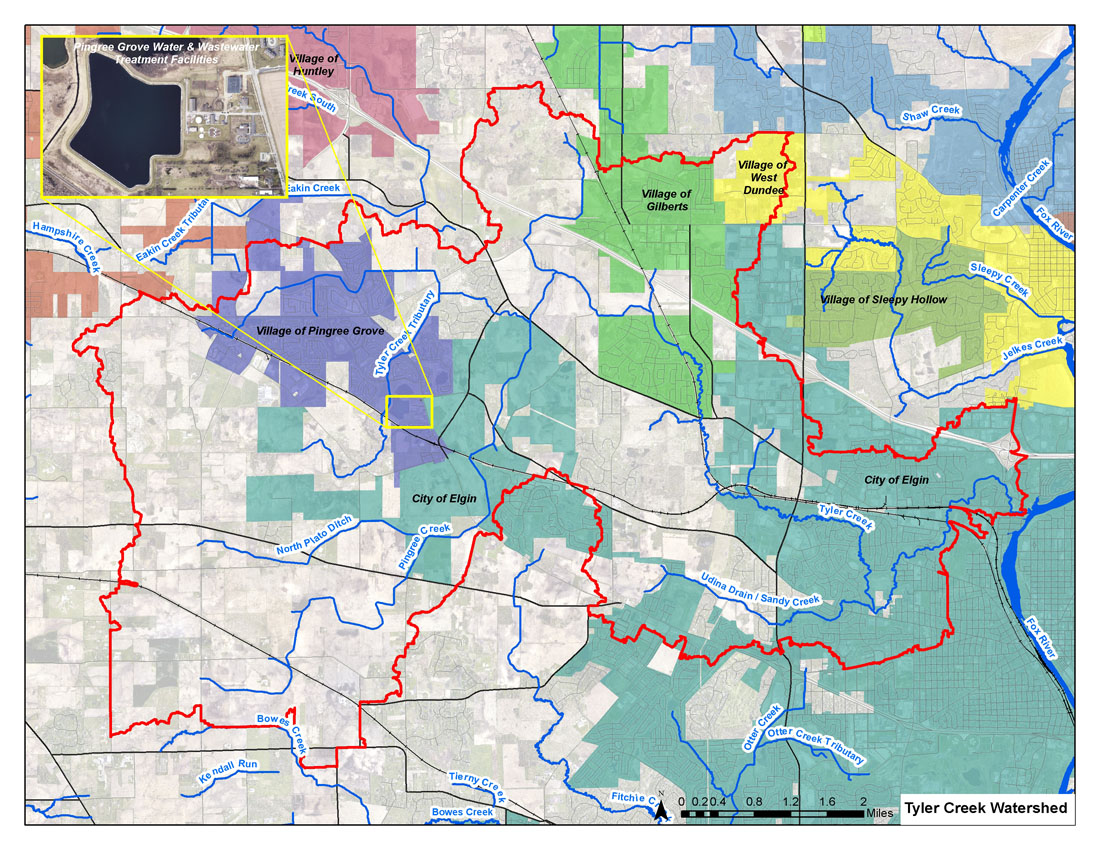
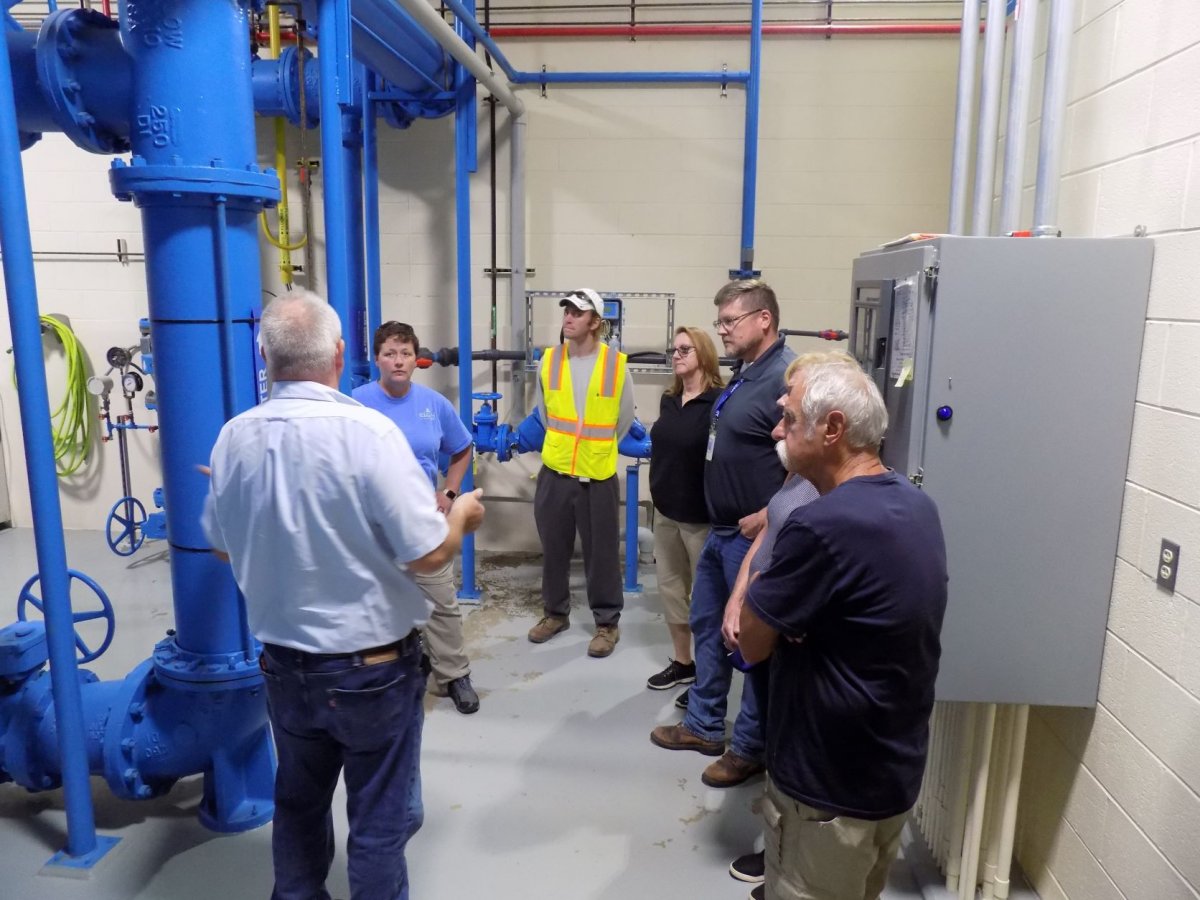
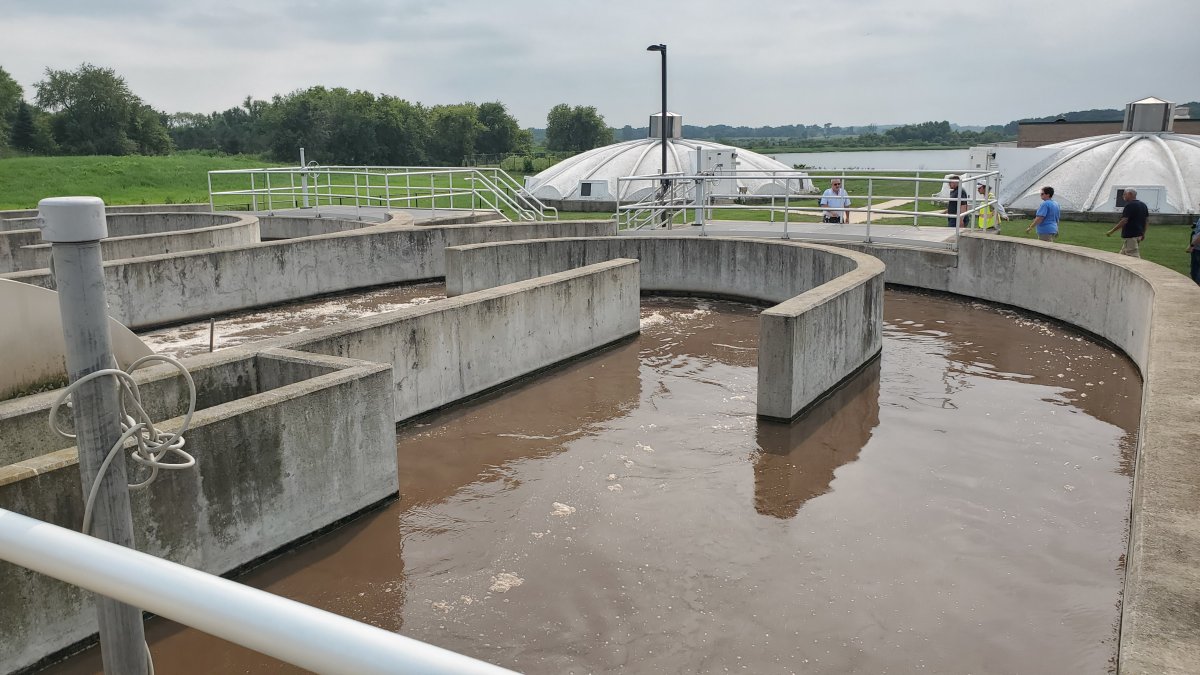
New Plan in 2008
Documents
Complete Tyler Creek Watershed Plan (24.78 MB file)
Lower Tyler Creek
Lower Tyler - Sandy Creek Recommendations
Central Tyler Creek Central Tyler Creek Recommendations
Upper Tyler Creek Upper Tyler CreekRecommendations
Sandy Creek
Lower Pingree Creek
Upper Pingree Creek
Annual Meeting Summary Sept. 18, 2019
Waterhsed Data Excel file
Tyler Creek Watershed By-Laws - Revised
MapsLower Tyler Creek
Lower Tyler - Sandy Creek Recommendations
Central Tyler Creek Central Tyler Creek Recommendations
Upper Tyler Creek Upper Tyler CreekRecommendations
Sandy Creek
Lower Pingree Creek
Upper Pingree Creek
